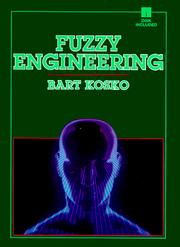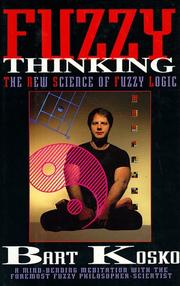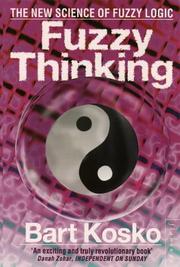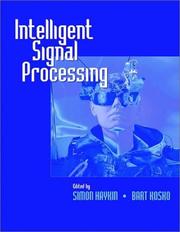| Listing 1 - 9 of 9 |
Sort by
|

ISBN: 0131249916 Year: 1997 Publisher: Upper Saddle River, N.J. : Prentice Hall,
Abstract | Keywords | Export | Availability | Bookmark
 Loading...
Loading...Choose an application
- Reference Manager
- EndNote
- RefWorks (Direct export to RefWorks)
Intelligent control systems. --- Fuzzy systems. --- Commande intelligente --- Systèmes flous --- Systèmes flous
Book
ISBN: 0136146945 9780136146940 Year: 1992 Publisher: Englewood Cliffs , Prentice-Hall,
Abstract | Keywords | Export | Availability | Bookmark
 Loading...
Loading...Choose an application
- Reference Manager
- EndNote
- RefWorks (Direct export to RefWorks)

ISBN: 1562828398 000255352X 9781562828394 Year: 1993 Publisher: New York (N.Y.) Hyperion
Abstract | Keywords | Export | Availability | Bookmark
 Loading...
Loading...Choose an application
- Reference Manager
- EndNote
- RefWorks (Direct export to RefWorks)
Logic --- Philosophy and science --- Fuzzy systems --- #SBIB:16G --- #SBIB:316.23H1 --- 316.75 --- Logica en wetenschapsleer --- Kennissociologie --- Kennissociologie. Ideologie --- Fuzzy systems. --- Logic. --- Philosophy and science. --- Lerarenopleiding --- (vak)didactiek wetenschappen --- (vak)didactiek wetenschappen. --- 316.75 Kennissociologie. Ideologie --- Science and philosophy --- Science --- Argumentation --- Deduction (Logic) --- Deductive logic --- Dialectic (Logic) --- Logic, Deductive --- Intellect --- Philosophy --- Psychology --- Reasoning --- Thought and thinking --- Systems, Fuzzy --- System analysis --- Fuzzy logic --- Methodology

ISBN: 0136123341 0136114350 9780136123347 Year: 1991 Publisher: Englewood Cliffs, N.J. Prentice Hall
Abstract | Keywords | Export | Availability | Bookmark
 Loading...
Loading...Choose an application
- Reference Manager
- EndNote
- RefWorks (Direct export to RefWorks)
Artificial intelligence. Robotics. Simulation. Graphics --- Computer architecture. Operating systems --- Learning: analogies; concept learning; induction; knowledge acquisition; language acquisition; parameter learning (Artificial intelligence)--See also {681.3*K32} --- 681.3*I26 Learning: analogies; concept learning; induction; knowledge acquisition; language acquisition; parameter learning (Artificial intelligence)--See also {681.3*K32} --- Artificial intelligence --- Expert systems (Computer science) --- Fuzzy systems --- Neural networks (Computer science) --- 681.3*I26 --- Artificial neural networks --- Nets, Neural (Computer science) --- Networks, Neural (Computer science) --- Neural nets (Computer science) --- Natural computation --- Soft computing --- Systems, Fuzzy --- System analysis --- Fuzzy logic --- Knowledge-based systems (Computer science) --- Systems, Expert (Computer science) --- Computer systems --- AI (Artificial intelligence) --- Artificial thinking --- Electronic brains --- Intellectronics --- Intelligence, Artificial --- Intelligent machines --- Machine intelligence --- Thinking, Artificial --- Bionics --- Cognitive science --- Digital computer simulation --- Electronic data processing --- Logic machines --- Machine theory --- Self-organizing systems --- Simulation methods --- Fifth generation computers --- Neural computers --- Artificial intelligence. --- Intelligence artificielle --- Systèmes experts (Informatique) --- Systèmes flous --- Réseaux neuronaux (Informatique) --- Expert systems (Computer science). --- Fuzzy systems. --- Neural networks (Computer science). --- Neurale netwerken. --- Vage systemen. --- Vage verzamelingen. --- Monograph --- Systèmes flous --- Reseaux neuronaux

ISBN: 0006547133 Year: 1994 Publisher: London Flamingo
Abstract | Keywords | Export | Availability | Bookmark
 Loading...
Loading...Choose an application
- Reference Manager
- EndNote
- RefWorks (Direct export to RefWorks)
Book
ISBN: 0133537315 Year: 1997 Publisher: New Jersey : Prentice Hall ,
Abstract | Keywords | Export | Availability | Bookmark
 Loading...
Loading...Choose an application
- Reference Manager
- EndNote
- RefWorks (Direct export to RefWorks)
Intelligent control systems --- Fuzzy systems --- Commande intelligente. --- Systèmes flous.

ISBN: 1886801010 9781886801011 Year: 1995 Publisher: Rockland Charles river media
Abstract | Keywords | Export | Availability | Bookmark
 Loading...
Loading...Choose an application
- Reference Manager
- EndNote
- RefWorks (Direct export to RefWorks)
Artificial intelligence. Robotics. Simulation. Graphics --- Mathematical logic --- Fuzzy logic --- 681.3*I2 --- 681.3*I23 --- Artificial intelligence. AI --- Deduction and theorem proving: answer/reason extraction; reasoning; resolution; metatheory; mathematical induction; logic programming (Artificial intelligence) --- 681.3*I23 Deduction and theorem proving: answer/reason extraction; reasoning; resolution; metatheory; mathematical induction; logic programming (Artificial intelligence) --- 681.3*I2 Artificial intelligence. AI
Book
ISBN: 1601190867 Year: 2001 Publisher: New York : [Piscataqay, New Jersey] : IEEE Press, IEEE Xplore,
Abstract | Keywords | Export | Availability | Bookmark
 Loading...
Loading...Choose an application
- Reference Manager
- EndNote
- RefWorks (Direct export to RefWorks)
"IEEE Press is proud to present the first selected reprint volume devoted to the new field of intelligent signal processing (ISP). ISP differs fundamentally from the classical approach to statistical signal processing in that the input-output behavior of a complex system is modeled by using "intelligent" or "model-free" techniques, rather than relying on the shortcomings of a mathematical model. Information is extracted from incoming signal and noise data, making few assumptions about the statistical structure of signals and their environment. Intelligent Signal Processing explores how ISP tools address the problems of practical neural systems, new signal data, and blind fuzzy approximators. The editors have compiled 20 articles written by prominent researchers covering 15 diverse, practical applications of this nascent topic, exposing the reader to the signal processing power of learning and adaptive systems. This essential reference is intended for researchers, professional engineers, and scientists working in statistical signal processing and its applications in various fields such as humanistic intelligence, stochastic resonance, financial markets, optimization, pattern recognition, signal detection, speech processing, and sensor fusion. Intelligent Signal Processing is also invaluable for graduate students and academics with a background in computer science, computer engineering, or electrical engineering. About the Editors Simon Haykin is the founding director of the Communications Research Laboratory at McMaster University, Hamilton, Ontario, Canada, where he serves as university professor. His research interests include nonlinear dynamics, neural networks and adaptive filters and their applications in radar and communications systems. Dr. Haykin is the editor for a series of books on "Adaptive and Learning Systems for Signal Processing, Communications and Control" (Publisher) and is both an IEEE Fellow and Fellow of the Royal Society of Canada. Bart Kosko is a past director of the University of Southern California's (USC) Signal and Image Processing Institute. He has authored several books, including Neural Networks and Fuzzy Systems, Neural Networks for Signal Processing (Publisher, copyright date) and Fuzzy Thinking (Publisher, copyright date), as well as the novel Nanotime (Publisher, copyright date). Dr. Kosko is an elected governor of the International Neural Network Society and has chaired many neural and fuzzy system conferences. Currently, he is associate professor of electrical engineering at USC.".

ISBN: 9780470544976 9780780360105 047054497X Year: 2001 Publisher: New York [Piscataqay, New Jersey] IEEE Press IEEE Xplore
Abstract | Keywords | Export | Availability | Bookmark
 Loading...
Loading...Choose an application
- Reference Manager
- EndNote
- RefWorks (Direct export to RefWorks)
"IEEE Press is proud to present the first selected reprint volume devoted to the new field of intelligent signal processing (ISP). ISP differs fundamentally from the classical approach to statistical signal processing in that the input-output behavior of a complex system is modeled by using "intelligent" or "model-free" techniques, rather than relying on the shortcomings of a mathematical model. Information is extracted from incoming signal and noise data, making few assumptions about the statistical structure of signals and their environment. Intelligent Signal Processing explores how ISP tools address the problems of practical neural systems, new signal data, and blind fuzzy approximators. The editors have compiled 20 articles written by prominent researchers covering 15 diverse, practical applications of this nascent topic, exposing the reader to the signal processing power of learning and adaptive systems. This essential reference is intended for researchers, professional engineers, and scientists working in statistical signal processing and its applications in various fields such as humanistic intelligence, stochastic resonance, financial markets, optimization, pattern recognition, signal detection, speech processing, and sensor fusion. Intelligent Signal Processing is also invaluable for graduate students and academics with a background in computer science, computer engineering, or electrical engineering. About the Editors Simon Haykin is the founding director of the Communications Research Laboratory at McMaster University, Hamilton, Ontario, Canada, where he serves as university professor. His research interests include nonlinear dynamics, neural networks and adaptive filters and their applications in radar and communications systems. Dr. Haykin is the editor for a series of books on "Adaptive and Learning Systems for Signal Processing, Communications and Control" (Publisher) and is both an IEEE Fellow and Fellow of the Royal Society of Canada. Bart Kosko is a past director of the University of Southern California's (USC) Signal and Image Processing Institute. He has authored several books, including Neural Networks and Fuzzy Systems, Neural Networks for Signal Processing (Publisher, copyright date) and Fuzzy Thinking (Publisher, copyright date), as well as the novel Nanotime (Publisher, copyright date). Dr. Kosko is an elected governor of the International Neural Network Society and has chaired many neural and fuzzy system conferences. Currently, he is associate professor of electrical engineering at USC.".
Signal processing --- Intelligent control systems. --- Adaptive signal processing. --- Digital techniques.
| Listing 1 - 9 of 9 |
Sort by
|

 Search
Search Feedback
Feedback About UniCat
About UniCat  Help
Help News
News